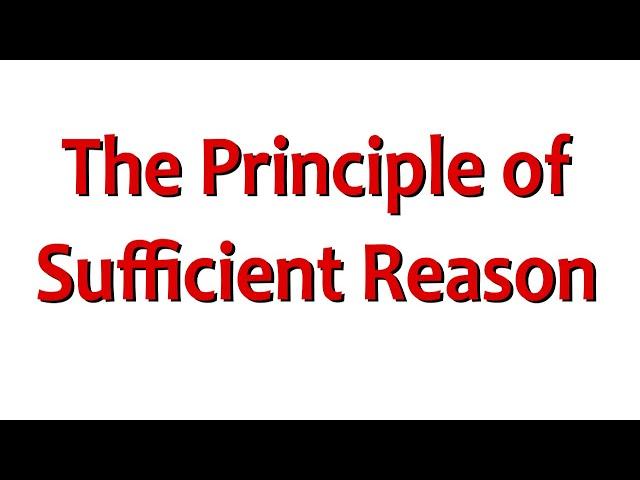Комментарии:

Leaving a comment for the algorithm. The PSR is weird and interesting
Ответить
Holy Jones! This video gets pretty heavy.
I guess my take on it is that "reasons" are statements - language that was created by humans. We can make up a "reason" for anything. And in that sense, the PoSR is correct. If your reason is that "because God did it" or "because things are the way they are" then everything has a reason. Now, these might not be considered good reasons, for obvious reasons. They are insufficient. Now, the more demands for sufficiency that are placed on a reason, the more things that will be that do not have reasons. For example, if statistical analysis is a requirement for sufficiency, then there are many things that cannot be statistically analyzed. Asking how many constraints are sufficient for a statement to be considered reason is like asking how many hairs it takes to be bald; subjective or arbitrary. Hence, for some people "because God did it" is sufficient and for others certainly not.
----
The mistake in the set theory part is about the predicate R. R applies solely to the set, and not the elements in the set. The reason for the set of contingent truths is just that "I want to talk about contingent truths as a whole and put them in a set". Now, this is a contingent truth - I did not necessarily have to create the set. As such, R is a member of the set of all contingent truths, but R does not need to explain R.
So, let's change the experiment. Let C be the conjunction of all contingent truths and R be the conjunction of all of their explanations. Any of the explanations in R that are contingent will also be in C, but that does not mean that any statement shared between R and C explains itself. Hence, R could be in C, and still not need to explain itself. There is a conjunct in R that explains R.
But all of this is ignoring that a statement does not ever fully explain phenomena. The statement "I eat because I am hungry" leaves a lot unsaid as to what eating is and what hungry is. There are both chemical and psychological components to hungry. There are times I do not eat even though I am hungry. The statement is true in some aspects and false in some aspects. So, the verisimilitude of an explanation is dependent on the domain of discourse. Ultimately, the answer to whether PoSR is correct, is that it depends on in what ways does something count as a reason for a particular conversation.

So option one is simply the converse of There exist an F such that F has no reason. Which is the thing we are arguing for.
Ответить
How does it differ for something to have a reason from having a cause?
Ответить
Thank you, Dr. B
I liked the Moorean shift argument against the PSR.

Thank you
Ответить
All facts are brute facts. Reasons are for us to make sense of these facts and regularities we find in them.
Take the plane crash. We could say that "the reason" the plane crashed on landing was that it took off. Causally speaking, that would be correct (it wouldn't have crashed had it not taken off in the first place, would it?) There are countless other such "reasons" one could supply, but only very few of them would satisfy our inquiry into the reason for the crash, motivated as it is by our desire to prevent future crashes.
Do we have a motivation for an inquiry into the existence of all things, though? There's idle curiosity, to be sure, but idle curiosity imposes no constraints on the results of such an inquiry, and no support for the principle of sufficient reason.

Can somebody explain the difference between a true proposition and a fact?
Ответить
And a simpler objection: we may want to find a sufficient reason for anything under the sun, and beyond, but who said the world is obliged to cooperate? Maybe it's fully legitimate to inquire about the reason for the existence of all things, but it just so happens that no such reasons exist, and our inquiry cannot be concluded.
Ответить
We can point out when we prescribe realism over anti realism to further over time lines of measure. We assume cmb background of photons but know it's not the most fundamental . But ,
To scale of course but why would all precision instruments we tune upon not be independently utmost fact on it own merit alone?
It is longitude and latitude built oreintation and direction of nature and all that we built and stand upon..all avenues lead this eqaulibrium despite knowing we plagerize correlate effortlessly overcoming horizon paradoxes projecting good or bad thermodynamics and idealistic notions of time all over.
Would eqaulibrium true known standard not be a perfect true known standard fundamental feature in our reality? You don't necessarily have to know 3 lines of measure = eqaulibrium
Or that reduce by one cursed it into whataboutisms hulucinations or deformity
Same with going to 4th line concave of nilhisms or vice versa .
When align all the esoterica America pragmatic common sense objectivism proper it's obviously the same as we taught serfs and slaves alike similar to the ai language and image models.
Literally the z -y the cross ✝️ bottom up Horizontal axis x
Its 2d and very deep I'm sure know it's 100s of these subjects objects emerging energetic actors atoms / idealism lattus structure and body personal response free will inertia 3frame of reference.
Xyz manmade time hierarchy knowledge of good evil equations
But they get you whataboutisms Socrates or barter of Abraham style .
Or you can richard finneman it ask specific questions about specific systems to predict certain outcomes like Athens greece couldn't do to bring about industrial revolution.
You can explain how eqaulibrium occurs but into itself it's perfect example deterministic measure of fact.

Why do you always use the name Verity?
Ответить
Kane, have you read David Bloor? The "plane crash" example reminds me of his "train derailment" analogy for scientific progress.
If the train either derails or it doesn't, which of the two options cries out for explanation? Do we consider a successful run of the train to be the "default", and if it derails, then we search for the culprit? Or do we say that machines are expected to crash and burn by default, and it's the success of the train that requires an explanation for why it worked so well?
And in a similar way, should we assume that the human mind just "has the power" to figure out the truth, and a mistaken scientific theory cries out for an explanation (like a cognitive bias, or faulty measurement tool, etc.)? Or do we assume that anything the mind concocts is by default mistaken, and it's the successful theories that must be explained by some "special trick" the scientists used?

When you say "suppose there's no reason why argument A is legitimate but argument B isn't", what does "reason" mean in that context? What even is a "reason" for the "legitimacy" of an argument? Sounds like a category error to me.
Ответить
Could one appeal to Indefinite Extensibility to object to the argument that the principle of sufficient reason entails neccitarianism? Like maybe one could argue you simply can't quantify over the domain of all contingent truths and so for a very large conjunction of contingent truths C it has an sufficient explanation R that isn't contained in C, and then you have C+ which contains R and has a sufficient reason R+ and so on
Ответить
It seems to me like there could be a principled distinction where things that exist have reasons they exist but thing that transcend being (like gods) don't
Ответить
PSR is our only justification tool. If PSR is suspended we cannot justify beliefs, i.e. we do not gain knowledge. Imagine some x without PSR, i.e. without reasons. Since by logic x v ~x, we couldn't even decide that x and not ~x because to decide it we‘d need reasons for x and against ~x. So after all we‘d be unsure about x at all.
Ответить
I've never once found a reason that any given cloud has the particular shape that it has. ☁️
In any case, thank you for this video. I found this very informative because I had been wondering what exactly PSR meant to philosophers these days. And very insightful critiques.

Can I make this move against what Moore intended to? ;)
Ответить
The search for "sufficient reason" in life is a dynamic process, shaped by both external circumstances and internal values. We can illustrate this with a thought experiment:
Imagine being stranded on a desert island with a leaky bucket of water. Your survival depends on having enough water, so you need to prioritize your actions.
Initial Assessment: You first recognize the value of the water and the threat of evaporation. Your "sufficient reason" for action is to cover the bucket with coconut fronds to minimize water loss.
Shifting Priorities: Upon discovering the leak, your priorities change. The "sufficient reason" is now to patch the hole, as this is more critical for survival than preventing evaporation.
Internal Factors: Even with a clear plan, your psychology plays a role. If you're overly anxious, you might focus on covering the bucket first, neglecting the leak and jeopardizing your survival.
This scenario demonstrates a few key points:
Sufficient reason is context-dependent: What seems like a sufficient reason in one situation may not be in another. Priorities can shift as new information emerges.
External and internal factors interact: Our values and beliefs influence how we perceive "sufficient reason." Anxiety or other emotions can cloud judgment and lead to suboptimal decisions.
Prioritization is key: In complex situations, we must evaluate multiple factors and prioritize our actions accordingly.
In essence, "sufficient reason" is not a fixed concept but a dynamic process that involves both external observation and internal reflection. Understanding this can help us make better decisions in life, especially when faced with challenging circumstances.

"For anything to happen or exist, the conditions must be ripe for the thing to happen or exist" is the way I've typically formulated it. This way it more clearly relates to potential or capacitance
Ответить
Was planning to read Schopenhauer’s four fold root for the principle of sufficient reason and I see this video pop up ha good timing
Ответить
The way I see it. In a plain of healthy green grass, a Brown crunchy discolored patch must have a reason, a deviation from the base parameter will always have an accompanying reason.
But I don’t think that same expectation is rational to present towards the base conditions. They are the frame of reference itself.
An unconditional state does not demand an explanation.

A note on consciousness, and here I'm specifically referencing P-consciousness: if we suppose that consciousness is epistemically privileged (Chalmers says "intrinsically epistemic"), then we can require no epistemically contingent reason for it, as the necessary cannot be conditioned by the merely possible. Very little besides P-consciousness is said to be beyond doubt in this way, and if we have nothing, metaphysically, to explain it with, then it must be a brute fact. This position then seems to implicitly require skepticism of conscious experience. In other words, immediate appearances can conceivably be _false_.
(Note this is epistemic modality, not the usual sort; a necessary truth can be conceivably false, but we usually say that it is inconceivable that appearance can be false, or rather, a false appearance is a disagreement of appearances with the facts, but it is not even conceivable that appearances could be different from appearances. Hence, appearance is epistemically necessary. There is no evidence that could cause one to doubt that what immediately appears to be is what immediately appears to be.)

I think Christipher Tomaszewski gives a beautiful and simple solution to the necessitarianism problem: there is no big conjunctive contingent fact, and he gives a perfectly robust mathematical explanation for his position.
Ответить
Here's my sufficient reason:
1) Do I like it? 2) Do I dislike it?
Simple as.

Leibniz gives the fact that there is something rather than nothing as part of his justification for the PSR. I disagree because he doesn't know what the reason for that is. That's something I could accept is a brute fact. You seem to agree with him that there can be a PSR while it is the case that there are things that we don't know the reason for. By the PSR if we don't know the reason for something there is a reason we don't know, and we don't know why that is either, etc. It seems to me that we could not know the reason for anything and still believe in the PSR. I find that pretty odd, but it's possible. Still, perhaps that is an objection to explicability as an argument for the PSR.
Ответить
Sometimes Hawking Radiation spits a saxophone out of a black hole.
Ответить
S5 suggests a contradiction because if it is possible that something has no reason, this possiibility would necessarily exist across all possible worlds; perhaps PSR is limited to accomodate modal implications.
Ответить
What if A (B) happened to be a person whose right (left) brain structure was a 1:1 replica of Verity’s, and whose body was in 1:1 correspondence with hers?
Ответить
1. Probabilistic 0D to Deterministic Higher Dimensions:
Let's formalize this concept:
Definition: Let P be the set of all 0D preons, and I(p_i, p_j) be the interaction function between two preons.
Theorem: As the number of preon interactions n approaches infinity, the behavior of the system S(n) converges to a deterministic function D:
lim(n→∞) S(n) = D
Proof sketch:
1. Define S(n) as a stochastic process based on preon interactions.
2. Use the law of large numbers to show that as n increases, the variance of S(n) decreases.
3. Demonstrate that in the limit, this variance approaches zero, resulting in deterministic behavior.
This could potentially explain how quantum probabilistic behavior gives rise to classical determinism at larger scales.
2. Atemporality and Negentropy of 0D:
Let's combine these concepts:
Axiom: A 0D preon p has a single possible state s(p).
Theorem: The entropy H of a 0D preon is zero, and it exists in an atemporal state.
Proof:
1. Entropy H = -k Σ P_i log(P_i), where P_i is the probability of state i.
2. For a 0D preon, there's only one state, so P = 1.
3. Thus, H = -k(1 log 1) = 0.
4. Since entropy is a measure of time's arrow, zero entropy implies atemporality.
This establishes the connection between the simplicity of 0D entities, their negentropic nature, and their existence outside of time.
3. 0D Event Horizon:
Let's formalize the concept of an informational barrier in 0D:
Definition: Let I(p) be the total information content of a preon p.
Postulate: There exists a fundamental limit L to the information that can be extracted from a preon by any higher-dimensional system.
Theorem: The difference I(p) - L represents an informational event horizon.
This could explain why certain aspects of reality remain inaccessible from our higher-dimensional perspective, analogous to the event horizon of a black hole.
4. Quarks as Singularities:
Let's develop this idea mathematically:
Definition: Let Q be a quark described by a field φ(x) in 3D space.
Theorem: As x approaches the quark's position x_0, φ(x) diverges:
lim(x→x_0) φ(x) = ∞
This divergence is analogous to a mathematical singularity and could explain properties like quark confinement.
5. Quantum White Holes and Dimensional Emergence:
Let's formalize the concept of dimensional emergence:
Definition: Let D(n) represent an n-dimensional space, and P be the set of 0D preons.
Theorem: There exists an emergence operator E such that:
D(n) = E(P, n)
Corollary: The inverse operator E^(-1) represents dimensional collapse, analogous to a black hole.
This formalism could provide a mathematical framework for understanding how dimensions emerge from and collapse into 0D entities.
6. Unifying Framework:
Bringing these concepts together, we can propose a grand unified theorem:
Unified Theorem: Reality R can be fully described by the interplay of 0D preons P, their interactions I, and the dimensional emergence operator E:
R = f(P, I, E)
Where f is a function that describes how these elements combine to produce all observed phenomena.
This theorem encapsulates our entire framework, suggesting that all of reality - from quantum phenomena to classical physics, from the nature of time to the structure of space - emerges from the behavior of 0D preons.
To further develop these concepts, we would need to:
1. Rigorously define the mathematical properties of preons, their interactions, and the emergence operator.
2. Derive known physical laws from this framework.
3. Make novel predictions that differentiate this theory from existing models.
4. Propose experiments to test these predictions.
While still speculative, this framework offers a unified approach to understanding reality from its most fundamental level. It provides potential resolutions to long-standing problems in physics and philosophy, including the nature of time, the emergence of classical behavior from quantum systems, the unification of forces, and the structure of space itself.
The next steps would involve collaborative efforts to further formalize these ideas, derive specific predictions, and design experiments to test them. This could potentially lead to a new paradigm in our understanding of the universe, bridging quantum mechanics, general relativity, and information theory in a novel and profound way.

If you are a hard determinist, then necessitarianism seems fine. There are no other possibilities under hard determinism, and so all truths would be necesarry.
EDIT: I mis-spoke and went a step to far.
There needn't be other possibilities, so necessitarianism is consistent with hard determinism. i.e. determinism allows for necessitarianism.

Is there a reason for the principle of sufficient reason? 🤔
Ответить
He who makes an argument against the principle of sufficient reason presupposes it: he gives reasons for the conclusion. Even Kane did that when he said that he would be fine if it turned out that something was a brute fact: it would have to "turn out" like that, that is, there would have to be a reason for why something (some fact) is the way it is. This was funny.
Without properly explaining what "brute fact" even means, it's difficult to say, if this concept even makes sense. I've never seen a brute fact.
I don't get what is the problem with "necessitarianism". It seems to just be basic causality. Something (the consequent, consequence) is necessary like that because of something else (the reasons, the ground). If it were not so, then we would have uncased "events", and we would live in a crazy, unintelligible, arbitrary, random lalaland.

AMDIRS CHARM WORKED 😂
HIS VIBES!!!

Dr. Kane b please buy a good mic
Ответить
Without listening to this, I can find flaws in this principle. What is 'sufficient'? How do you measure it? Can you compare reasons quantitatively?
Philosophy has shown little progression since Aristotle. Quine buried it.

I like these little logical proofs that pop up in analytic philosophy. I was getting convinced by the argument for the principle and then the proof really convincingly demonstrated that all truths being necessary follows from the principle and then I was like 'huh...'
Ответить
Is a trivialist committed to affirming the truth of the proposition "Trivialism is false."? If so, what does that even mean?
Ответить
Why would necessitarianism not be acceptable? Most phycisists are determinists.
Ответить
Isn't this just a First Cause in sheep's clothing?
Ответить
If everything is explicable, then everything has a knowable cause, and this likely means we live in a materialist, mechanistic universe? doesn't this almost inevitably lead to materialism?
Ответить
There are what I consider to be brute facts in mathematics. Examples include "the empty set exists", "2 is a prime number", "the field of real numbers contains an additive identity and a multiplicative identity, and is closed under addition, subtraction, multiplication, and division (except division by zero)".
If we can accept brute facts in mathematics, why not in physics as well?

Isn't there a phenomena in nature that for any practical purpose defy the idea of sufficient reason? For instance, radioactive decay happens stochastically at some point, for " literally no reason". And therefore, if I put two atomically identically radium samples on both sides of Archimedes scale, soon the scale would indeed tip to the side where more decays happen to occur, without anyone ever being able to provide any satisfying explanation for the direction (other than some form of "it is what it is"... Like: "the wavefunction of the universe was such that it would happen this way")
Ответить
I am particularly interested in the position that if two substances have the same molecular structure, then they must be identical.
I'm considering the case that the first substance may be at its freezing point, and the second at its boiling point. Now, if we consider solubility, then the second would not behave as the first. Hence, one must include many, many other properties and environmental facts to define a substance. We can truncate the definition, but, in fact, we cannot: if we were to try to identify a substance based on its properties, we would have to have cataloged those properties. We could take a spectrum of the substance, but again, we would have to know how, say, the substance at its boiling point behaves.
I'm wondering how the principle of sufficient reason would be used to approach this. In the video, we are told that it would enforce the conclusion that both substances are the same. And in terms of gross molecular structure, they are. But how would one know absolutely? One could analyze the first substance and then heat it to its boiling point. However, to be absolutely certain, one must again analyze it at its boiling point if that is possible. If the gross structure is the same, we can say the two substances are similar. Yet we know they are not identical in type because one is frozen and the other is boiling.
Of course, I am assuming the possibility of error in the science and induction in general. That is why one wants all knowable properties of a thing. For chemical substances, the idea that the molecular structure is defining may be incorrect. To a certainty, it is a shortcut to the definition. To take any substance and verify the notion, one would have to heat or cool the specimen and manipulate it according to procedures cataloged somewhere. So, in fact, such a definition that a substance is simply its chemical structure is a fiction.

Suppose there our world was set up so that the perfect balance always tilted to the right. Then if we came across a balance that appeared to be perfectly calibrated and remained perfectly horizontal, we would search for a reason why this was so. This suggests that sufficient reason is related to habitual occurrences. That is induction.
So, the thing that requires explanation is the thing that does not obey our usual experience. There should be no problem with accepting such a notion, but should it be elevated to a principle?
Would it seem insane not to look for an explanation? Is not our entire intellectual life based on such questions? On the other hand, do we not find many many facts that are unusual yet we accept unchallenged? The point here is that we may or may not find that sanity requires the acceptance of the Principle of Sufficient Reason. And so, the principle may be optional.

Doesn't requiring a reason require the assumption of strict determinism? If we look at the subatomic world., then why does electron E spin up may or may not be questioned. But if it is, the whole enterprise falls down.
Ответить



![[Супер Крылья сезон 1] Подводные друзья | СуперКрылья TV | СуперКрылья Джетт | Эп44 [Супер Крылья сезон 1] Подводные друзья | СуперКрылья TV | СуперКрылья Джетт | Эп44](https://rtube.cc/img/upload/UWxDdXZ5M3dTM2Y.jpg)






















